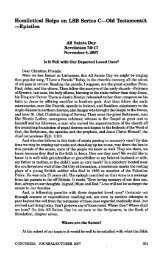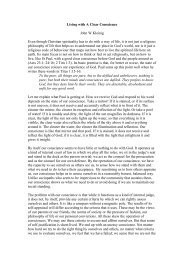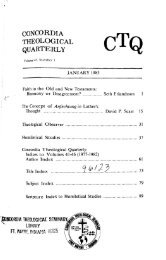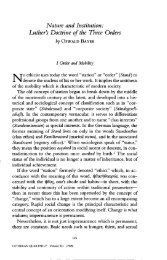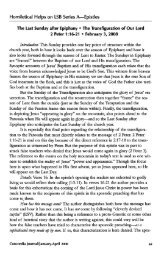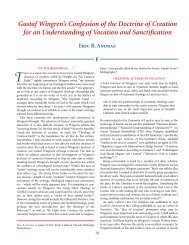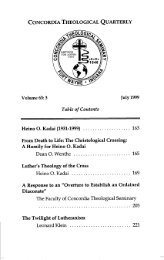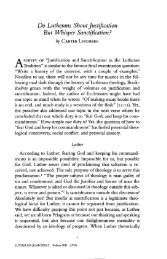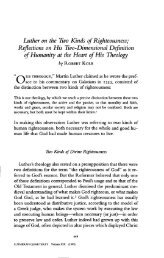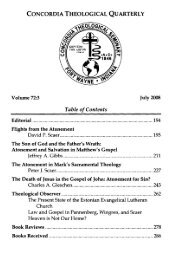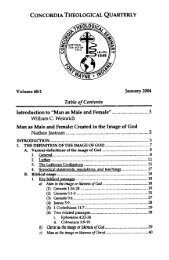Depression and the Soul Pietsch
Depression and the Soul Pietsch
Depression and the Soul Pietsch
You also want an ePaper? Increase the reach of your titles
YUMPU automatically turns print PDFs into web optimized ePapers that Google loves.
Australian Lu<strong>the</strong>ran College<br />
Opening Lecture 2010<br />
<strong>Depression</strong> <strong>and</strong> <strong>the</strong> <strong>Soul</strong><br />
Stephen <strong>Pietsch</strong><br />
_________________________________________________<br />
1. Introduction<br />
Why this topic<br />
Why depression I chose this topic because researching this area in <strong>the</strong> last months has made me aware<br />
of just what a hidden plague it is in Australia, 1 <strong>and</strong> how little <strong>the</strong> Christian churches have seriously<br />
begun to underst<strong>and</strong> or respond to it.<br />
The current community <strong>and</strong> media focus on this illness challenges us in <strong>the</strong> church, <strong>and</strong> places in front<br />
of us an opportunity to serve <strong>and</strong> witness, using <strong>the</strong> rich spiritual resources God has given to us for <strong>the</strong><br />
care <strong>and</strong> cure of souls, <strong>the</strong> term “soul” referring here to people as whole spiritual beings before God.<br />
Addressing <strong>the</strong>se issues, <strong>the</strong> two basic questions for our consideration are:<br />
• In what way is depression a spiritual illness<br />
• how might we as Christians, respond effectively to <strong>the</strong> spiritual needs of people with depression<br />
The Black Dog<br />
One of <strong>the</strong> things we “Aussie battlers” have going for us is our Australian tradition of using humour to<br />
face trouble <strong>and</strong> suffering. You may remember that Churchill called depression his “black dog”. That<br />
nick name has been adopted by a foundation for depression research <strong>and</strong> treatment - <strong>the</strong> “Black Dog<br />
Institute”. In one of <strong>the</strong>ir information booklets <strong>the</strong>re is a cartoon of a man, st<strong>and</strong>ing at <strong>the</strong> edge of a cliff.<br />
He is not about to jump over, but is throwing a stick for his black dog, saying “fetch!” (Johnstone: 30).<br />
This is <strong>the</strong> spirit in which I wish to approach this issue, <strong>and</strong> I invite you, <strong>the</strong> reader to do <strong>the</strong> same. We<br />
are not powerless victims. We are people of hope – <strong>the</strong> hope we have in Jesus Christ. The black dog<br />
hangs around sometimes, but let us not be afraid of him or of talking about him. He is only a dog after<br />
all.<br />
2. Background<br />
What is depression<br />
What are we talking about here <strong>Depression</strong>, as <strong>the</strong> term is generally used today, is not just a passing<br />
feeling of despondency in response to a disappointment or problem, but a persistent debilitating illness,<br />
which is medically diagnosed <strong>and</strong> treated.<br />
It is of course associated with o<strong>the</strong>r problems <strong>and</strong> issues, like anxiety, which often occurs toge<strong>the</strong>r with<br />
depression, <strong>and</strong> of course suicide (both significant issues which lie outside <strong>the</strong> focus of this paper).<br />
1 The current statistical analyses indicate that 20% of Australians will experience major or clinical depression at some point<br />
in <strong>the</strong>ir lives. http://www.mindframe-media.info/site/index.cfmdisplay=85541<br />
1
Serious medical research is being done in <strong>the</strong> area of neuropsychology, seeking to better underst<strong>and</strong><br />
<strong>the</strong> dynamics of brain biochemistry, <strong>and</strong> develop better antidepressant medications (Hunter &<br />
Hunter 27-37).<br />
• The Psychological<br />
Clinical psychologists have been working with depressive patients for many years, using different<br />
approaches <strong>and</strong> models of <strong>the</strong>rapy <strong>and</strong> counselling. The adaptation <strong>and</strong> development of cognitive<br />
<strong>the</strong>rapies have proved especially effective in helping depressed people reshape <strong>the</strong>ir negative<br />
thinking <strong>and</strong> belief systems (Hollon & Dimidjian: 586-598).<br />
The general consensus is that people receiving medical drug treatment for depression toge<strong>the</strong>r with<br />
psychological <strong>the</strong>rapy or counseling considerably increase <strong>the</strong>ir chances of full recovery (Blazer 3,<br />
Hunter & Hunter 73).<br />
• The Social<br />
As outlined above, in recent decades it has become apparent, that depression to some extent a<br />
socially conditioned illness (Blazer: 27-37). Considerable efforts have <strong>the</strong>refore been made to<br />
address it at <strong>the</strong> social level, by reducing <strong>the</strong> stigma attached to it <strong>and</strong> raising awareness of <strong>the</strong> risk<br />
factors. Over <strong>the</strong> last five years in Australia important social strategies have been put in place.<br />
Initiatives like Beyond Blue <strong>and</strong> <strong>the</strong> Black Dog Institute have set up comprehensive websites with<br />
high quality information. They also provide simple self-assessment tools, <strong>and</strong> provide option for<br />
seeking treatment. They have enjoyed unprecedented media exposure <strong>and</strong> <strong>the</strong>ir effectiveness has<br />
been enhanced by <strong>the</strong> number of high profile Australians publicly speaking about <strong>the</strong>ir depression in<br />
order to empower <strong>and</strong> encourage o<strong>the</strong>rs to seek <strong>the</strong> help <strong>the</strong>y need 5 .<br />
3. <strong>Depression</strong> <strong>and</strong> <strong>the</strong> <strong>Soul</strong><br />
The missing spiritual dimension<br />
These three aspects of underst<strong>and</strong>ing <strong>and</strong> responding to depression are very positive <strong>and</strong> have brought<br />
great benefits to <strong>the</strong> community, but as I have none too subtly been hinting, <strong>the</strong>re’s a gap here, a missing<br />
fourth dimension to <strong>the</strong> puzzle of depression – <strong>the</strong> spiritual.<br />
The wisdom of past eras<br />
In our increasingly secular culture, <strong>the</strong> crucial spiritual dimension of depression has fairly much<br />
disappeared from view. But in terms of history, this is a very recent development. Until around <strong>the</strong> turn<br />
of <strong>the</strong> 20 th century, depression (or to use its historic name, “melancholy”) had not been seen merely as a<br />
sickness of <strong>the</strong> mind, but as something much more profound: a manifestation of <strong>the</strong> deep human struggle<br />
with <strong>the</strong> spiritual darkness shared by all humanity (Radden: 5-28). As such, it was considered to be part<br />
of <strong>the</strong> normal range of human sufferings to be endured; sometimes tragically <strong>and</strong> wretchedly, but<br />
sometimes creatively, heroically, <strong>and</strong> even nobly. In <strong>the</strong> 18 th <strong>and</strong> 19 th centuries, for example, melancholy<br />
was seen as <strong>the</strong> sign of a person with a truly deep, creative <strong>and</strong> spiritual sensibility (Radden 12-13).<br />
Melancholic souls were seen as people with deeper awareness <strong>and</strong> perception of reality. Most people can<br />
name at least one melancholic genius. History is littered with <strong>the</strong>m: poets, authors, painters, composers,<br />
scholars, <strong>the</strong>ologians, spiritual leaders <strong>and</strong> comics. 6<br />
5 Politicians, Geoff Gallop, Andrew Robb; actors Rebecca Gibney <strong>and</strong> Gary MacDonald, <strong>and</strong> swimming legend, Dawn Fraser<br />
are just a few of <strong>the</strong> famous Australians who have publicly acknowledged <strong>the</strong>ir struggles with depression, encouraging o<strong>the</strong>rs<br />
with <strong>the</strong> illness to hope <strong>and</strong> work towards recovery <strong>and</strong> a full life.<br />
6 The Mixed Nuts website (see references) has an extensive list of famous artists <strong>and</strong> o<strong>the</strong>r geniuses throughout history who<br />
have suffered from depression.<br />
3
says that <strong>the</strong> devil uses our natural weaknesses, our flaws <strong>and</strong> vulnerabilities: “where <strong>the</strong> fence is<br />
lowest, <strong>the</strong>re he climbs over” (1531:1) he warns.<br />
This is part of <strong>the</strong> tentatio <strong>and</strong> Anfechtung that Christians have to deal with in this world, <strong>the</strong> testing <strong>and</strong><br />
suffering we experience as <strong>the</strong> devil seeks to kick us when we are down, to demolish our faith <strong>and</strong> trust<br />
in God. This is superbly shown in a woodcut by Cranach, illustrating <strong>the</strong> sixth petition of <strong>the</strong> Lord’s<br />
Prayer – “lead us not into temptation (trial or hard testing). It depicts Jesus as <strong>the</strong> Good shepherd (John<br />
10) protecting a lamb, as <strong>the</strong> devil disputes with him. At <strong>the</strong> devil’s feet prowls a lion (1 Peter 5:8), with<br />
its jaws agape, seeking to devour <strong>and</strong> destroy <strong>the</strong> lamb. 9<br />
To think in this way about <strong>the</strong> devil’s work might sound out of place in a world where we now see<br />
ourselves underst<strong>and</strong>ing cause <strong>and</strong> effect in more enlightened psychological terms. But notice how this<br />
view of <strong>the</strong> devil’s activity is not part of some superstitious or imaginary spiritual world. It is ra<strong>the</strong>r<br />
grounded in <strong>the</strong> reality of life, experience <strong>and</strong> suffering in this world, just as God’s life-giving presence<br />
is made affective to us through real <strong>and</strong> material means: our fellow believers <strong>and</strong> <strong>the</strong> Word <strong>and</strong><br />
Sacraments.<br />
The Danger of focussing on <strong>the</strong> demonic<br />
While we should be alert to <strong>the</strong> devil’s spiritual attack on people in <strong>the</strong>ir depression, <strong>the</strong>re is need here<br />
for caution. 10 For severely depressed people who are struggling with <strong>the</strong> spiritual realm <strong>and</strong> <strong>the</strong>ir<br />
relationship to it, suggestions of demonic or diabolic activity may add to <strong>the</strong> negativity of <strong>the</strong>ir thoughts<br />
<strong>and</strong> make <strong>the</strong>ir depression worse, especially in view of <strong>the</strong> tendency among depressed people to<br />
catasrophise. Careful clear distinctions need to be made. The devil’s ever-present testing in our lives is<br />
one thing – demonic attacks are ano<strong>the</strong>r. This is a danger especially with people who may be suffering<br />
depression as part of ano<strong>the</strong>r psychotic illness. 11<br />
Some churches who have majored in what <strong>the</strong>y call “deliverance ministry”, have done great damage to<br />
people, by <strong>the</strong>ir prima facie assumption that depressed people are demon-possessed or demonoppressed.<br />
Such serious demonic manifestations are possible of course, but in most cases of depression<br />
<strong>the</strong>re is no evidence for <strong>the</strong>se assumptions. The affect on <strong>the</strong> person is often that <strong>the</strong> supposed demonic<br />
presence in <strong>the</strong>ir life becomes <strong>the</strong> focus of <strong>the</strong>ir spiritual awareness instead of <strong>the</strong> grace <strong>and</strong> love of God<br />
in Christ. It is clear from <strong>the</strong> church’s experience over a long time now, that such approaches are<br />
potentially spiritually abusive <strong>and</strong> very dangerous (Schubert:139).<br />
5. The Spiritual Dynamics of <strong>Depression</strong><br />
Having set <strong>the</strong> context a little, we now turn to <strong>the</strong> spiritual dynamics at work in <strong>the</strong> lives of people<br />
struggling with depression.<br />
9 This wood cut can be viewed on <strong>the</strong> Wikimedia Commons website:<br />
http://images.google.com.au/imgresimgurl=http://upload.wikimedia.org/w<br />
10 In <strong>the</strong> preface of his book, The Screwtape Letters, C.S. Lewis (9) observes: There are two equal <strong>and</strong> opposite errors into<br />
which our race can fall about <strong>the</strong> devils. One is to disbelieve in <strong>the</strong>ir existence. The o<strong>the</strong>r is to believe, <strong>and</strong> to feel an<br />
unhealthy interest in <strong>the</strong>m. They <strong>the</strong>mselves are equally pleased by both errors, <strong>and</strong> hail materialist or magician with <strong>the</strong><br />
same delight.<br />
11 E.g. Bipolar disorder <strong>and</strong> schizophrenia - psychotic illnesses in which people usually suffer from delusions <strong>and</strong><br />
hallucinations, <strong>and</strong> who are sometimes out of contact with reality. People with psychotic illness are sometimes very open to<br />
suggestion regarding <strong>the</strong> spiritual realm’s interference in <strong>the</strong>ir lives. It takes great discernment <strong>and</strong> wisdom to know how <strong>and</strong><br />
when to respond to this appropriately, without feeding into <strong>and</strong> complicating <strong>the</strong> person’s psychosis.<br />
5
faith altoge<strong>the</strong>r. And so we turn faith into our act ra<strong>the</strong>r than <strong>the</strong> reception of God’s mercy” (2-3).<br />
<strong>Depression</strong> <strong>the</strong>n attacks <strong>the</strong> life-giving core of a person’s faith – <strong>the</strong>ir justification, <strong>the</strong>ir certainty of<br />
God’s grace <strong>and</strong> forgiveness <strong>and</strong> love toward <strong>the</strong>m.<br />
In spiritual terms, <strong>the</strong> vortex of depression drags us back into <strong>the</strong> old self, with all its attempts at selfjustification<br />
<strong>and</strong> its agonized struggle to achieve its own righteousness. To use <strong>the</strong> famous description<br />
adopted by Augustine <strong>and</strong> Lu<strong>the</strong>r 12 , we are incurvatus in se (curved in on self) (Lu<strong>the</strong>r, Lectures on<br />
Romans, 1515-16: 245, 291, 292, 313, 351).<br />
But inside this old self we find, to our horror, that <strong>the</strong>re is no foothold or solid ground to st<strong>and</strong> on, <strong>and</strong><br />
we quickly fall deeper into <strong>the</strong> vortex. The heart <strong>and</strong> conscience collapse under <strong>the</strong> weight of it all. 13<br />
This is <strong>the</strong> spiritual hell of depression that Lu<strong>the</strong>r experienced, <strong>and</strong> which he lived through with many<br />
whom he pastored during bouts of dark depression.<br />
This self-vortex is depression’s essential spiritual dynamic – <strong>the</strong> deadly force that drives it. This force<br />
shows itself in a person’s life in several different ways. We now briefly consider <strong>the</strong>se, in order to<br />
underst<strong>and</strong> <strong>the</strong>m, before reflecting on how we may respond to <strong>the</strong>m.<br />
Body & Senses<br />
It might seem strange to begin this description by talking about <strong>the</strong> body. Isn’t depression a mental<br />
illness We have for too long accepted <strong>the</strong> dualism that has been h<strong>and</strong>ed to us by twentieth century<br />
medical science – <strong>the</strong> splitting of body <strong>and</strong> mind. Human beings are integrated beings, ensouled bodies<br />
<strong>and</strong> embodied souls. Like o<strong>the</strong>r illnesses, depression effects as a whole people, <strong>and</strong> we should not be<br />
surprised by <strong>the</strong> fact that many people describe <strong>the</strong>ir depressive symptoms in bodily terms. One man<br />
described his depression during <strong>the</strong> course of a day: “a tight ball that starts in <strong>the</strong> stomach <strong>and</strong> work its<br />
way to my head”. Many o<strong>the</strong>r bodily sensations <strong>and</strong> signs are experienced by depression sufferers too.<br />
In some cases of depression 14 , one of <strong>the</strong> outward signs that <strong>the</strong> illness is taking hold is that people often<br />
stop caring about <strong>the</strong>ir appearance, grooming <strong>and</strong> general health. The physical environment <strong>and</strong> o<strong>the</strong>r<br />
sensory <strong>and</strong> affective realties are locked out. For some, withdrawal <strong>and</strong> self-neglect are an expression of<br />
<strong>the</strong>ir deep self loathing <strong>and</strong> sense of worthlessness.<br />
Such a turning away from one’s own body <strong>and</strong> its senses is a deeply negative spiritual act. It isolates <strong>the</strong><br />
person from all o<strong>the</strong>r persons, all beauty, all pleasure, all engagement with reality outside, including<br />
God. Lost in <strong>the</strong> dark inner vortex, <strong>the</strong> body – through which we engage in real life - is left to chaos <strong>and</strong><br />
neglect.<br />
Thinking <strong>and</strong> Believing<br />
12 Jason Ingalls’ fascinating <strong>and</strong> informative article (in response to Matt Jenson’s book The Gravity of Sin) about <strong>the</strong><br />
<strong>the</strong>ological <strong>and</strong> behavourial aspects of human sin, using this <strong>the</strong>me, shows <strong>the</strong> deep ego-centric programming that manifests<br />
itself so negatively in depression – see references.<br />
13 It can sometimes be quite shocking to listen to people in this state of spiritual collapse. Normally strong <strong>and</strong> faithful<br />
Christians may be overwhelmed by <strong>the</strong>ir sin <strong>and</strong> be convinced that <strong>the</strong>y are eternally lost. They may deny <strong>the</strong>ir faith <strong>and</strong><br />
curse God. They may deny <strong>the</strong>ir baptism <strong>and</strong> salvation, <strong>and</strong> reject <strong>the</strong> Word <strong>and</strong> Sacraments. Disturbing though this is, it does<br />
not call for censure but for underst<strong>and</strong>ing, <strong>and</strong> when <strong>the</strong> time is right <strong>and</strong> <strong>the</strong>re is a moment of openness, reassurance.<br />
14 Of course not all cases of depression show outward observable signs. It is in <strong>the</strong> nature of this insidious illness that some<br />
people isolate <strong>the</strong>mselves by masking <strong>the</strong>ir symptoms in order to keep <strong>the</strong>ir illness secret.<br />
7
Now we turn our attention to how we might respond to this sickness of <strong>the</strong> soul, using <strong>the</strong> unique<br />
resources we have, as <strong>the</strong> church of Christ, for <strong>the</strong> healing <strong>and</strong> care of people suffering depression.<br />
6. Spiritual Responses to <strong>Depression</strong><br />
Realism <strong>and</strong> Patience<br />
One thing that is very helpful for those touched by depression, besides a working knowledge of <strong>the</strong><br />
illness, is a realistic attitude to it. While it is a cause of sometimes severe suffering, it is not surprising.<br />
Nor is it some gross injustice, shame or dishonour that depression may come to me or you. It is after all<br />
a very common illness that has plagued humanity for millenia.<br />
Having realistic expectations about recovery time also helps, as does <strong>the</strong> recognition that depression<br />
may return more than once <strong>and</strong> need to be managed ra<strong>the</strong>r than permanently cured. As people under <strong>the</strong><br />
grace of Christ, we might sometimes find it hard to underst<strong>and</strong> or accept that healing does not come<br />
swiftly. Lu<strong>the</strong>r pointed out in his letters to depressed people that sometimes it is this very passing of<br />
time – yes, <strong>the</strong> thing we feel least able to tolerate - that is most essential for our healing <strong>and</strong> recovery,<br />
because it is part of <strong>the</strong> a larger purpose of God in our life. 16<br />
The spiritual fruit of patience is something we have not cultivated much in recent generations. Our<br />
humanistic ideal of life drives us toward <strong>the</strong> immediate resolution of all discomfort <strong>and</strong> suffering, since<br />
suffering can be seen as nothing but a threat to <strong>the</strong> goodness <strong>and</strong> quality of life. The biblical perspective<br />
on suffering would challenge us ra<strong>the</strong>r to allow it room, to receive it in faith, praying for God to help us<br />
bear it until he sees fit to take it away. 17 Such an idea sounds almost “heretical” in our culture, in which<br />
a full life consists of pleasure, gratification <strong>and</strong> <strong>the</strong>n more pleasure <strong>and</strong> gratification.<br />
Caring & Keeping Vigil<br />
One of <strong>the</strong> major things, possibly <strong>the</strong> most important single thing, in <strong>the</strong> spiritual care of depressed<br />
people is <strong>the</strong> Christian friendship <strong>and</strong> support of o<strong>the</strong>rs; what Lu<strong>the</strong>r calls <strong>the</strong> “conversation <strong>and</strong><br />
consolation of <strong>the</strong> bro<strong>the</strong>rs <strong>and</strong> sisters” (SA 3,4; Kolb <strong>and</strong> Wengert: 319) This is <strong>the</strong> most sustainable<br />
<strong>and</strong> available form of pastoral care we can offer depressed persons.<br />
Depressed people usually seek solitude <strong>and</strong> isolation, <strong>and</strong> a certain amount of rest is certainly needed,<br />
but <strong>the</strong>y also need <strong>the</strong> company of o<strong>the</strong>rs, because God’s pastoral care <strong>and</strong> healing comes through o<strong>the</strong>r<br />
believers. Lu<strong>the</strong>r’s letter to Matthias Weller, a depressed young musician who is caught in <strong>the</strong> vortex of<br />
self is very telling:<br />
Do not dwell on your own thoughts but listen to what o<strong>the</strong>rs have to say to you, for God has comm<strong>and</strong>ed<br />
men to comfort <strong>the</strong>ir brethren, <strong>and</strong> it is his will that we should receive such consolation as God’s very<br />
own (Lu<strong>the</strong>r, Letters of Spiritual Counsel: 96).<br />
This kind of pastoral care <strong>and</strong> friendship may include very ordinary things, like helping <strong>the</strong> depressed<br />
person to go on functioning in <strong>the</strong>ir routines, especially in following through on <strong>the</strong>ir medical care <strong>and</strong><br />
on taking <strong>the</strong>ir prescribed medication. It means being <strong>the</strong> initiator of contact. It of course includes<br />
16 In one of his 16 letters of comfort to <strong>the</strong> young depressed Prince Joachim or Anhalt (1534, Briefwechsel, 7. B<strong>and</strong>, No.<br />
2121) Lu<strong>the</strong>r uses <strong>the</strong> image of <strong>the</strong> people of Israel waiting for deliverance from Pharoah at <strong>the</strong> banks of <strong>the</strong> red sea,<br />
reflecting that it was to God’s greater glory that <strong>the</strong>y should be saved when <strong>the</strong>y had waited until <strong>the</strong> right moment, <strong>and</strong> that it<br />
was to Israel’s benefit that <strong>the</strong>y learned to trust <strong>and</strong> wait for God instead of continuing to trust in human strength.<br />
17 This kind of spiritual patience is especially evident in our own Lu<strong>the</strong>ran tradition in <strong>the</strong> hymns <strong>and</strong> spirituality of <strong>the</strong> 17 th<br />
century, particularly those of Paul Gerhard (Kleinig 64-65), many of which make helpful devotional tools for depressed<br />
persons. They promote faith, trust <strong>and</strong> patience in suffering as something to be cultivated <strong>and</strong> learned.<br />
9
Suffering from depression is not in itself a sin, nor can it be interpreted as divine punishment for<br />
particular sins, but is a symptom of <strong>the</strong> brokenness of sin in our world. At <strong>the</strong> same time <strong>the</strong> truth is that<br />
depression sufferers are sinners too, with <strong>the</strong>ir own particular temptations <strong>and</strong> weaknesses. 22<br />
Recognising <strong>and</strong> confessing <strong>the</strong>ir sins <strong>and</strong> weakness before God may be a very helpful preparation for<br />
receiving Gods healing forgiveness, grace <strong>and</strong> provision (Lake: 346). There are rites <strong>and</strong> resources for<br />
<strong>the</strong> use of both lay <strong>and</strong> ordained pastoral carers to use for this purpose (Schubert: 27-39).<br />
Private confession <strong>and</strong> absolution is best used within <strong>the</strong> context of pastoral conversation, counselling<br />
<strong>and</strong> prayer. 23 Discerning, clarifying, encouraging <strong>and</strong> listening are needed to introduce <strong>the</strong> rite <strong>and</strong> <strong>the</strong>n<br />
set helpful directions afterwards. Depressed people need above all to have emphasized to <strong>the</strong>m <strong>the</strong><br />
reassurance of <strong>the</strong> Gospel. These performative words of forgiveness are powerful <strong>and</strong> healing. While we<br />
should not expect an instant recovery from <strong>the</strong>m, in <strong>the</strong> over-all journey toward healing <strong>the</strong> soul, <strong>the</strong>y<br />
play a central role in breaking <strong>the</strong> power of <strong>the</strong> vortex.<br />
Worship Participation<br />
Though people with depression are often resistant to God’s Word, <strong>and</strong> may even be angry with God,<br />
going to public worship is very important for <strong>the</strong>m. Church-going is not popularly thought to be a form<br />
of pastoral care, but it is <strong>the</strong> most basic <strong>and</strong> effective form of pastoral care; it’s <strong>the</strong> way for a depressed<br />
person to come into contact with God’s gifts. Despite <strong>the</strong> toxicity of <strong>the</strong> depressive thoughts <strong>and</strong> feelings<br />
<strong>the</strong>y bring with <strong>the</strong>m, <strong>the</strong> synergy between <strong>the</strong> Word <strong>and</strong> <strong>the</strong> ga<strong>the</strong>red community of <strong>the</strong> saints is a<br />
healing environment.<br />
And here is <strong>the</strong> crucial point: <strong>the</strong> power <strong>and</strong> efficacy of <strong>the</strong> healing that God gives to us in worship,<br />
through his Word <strong>and</strong> Sacraments, does not depend on our ability to directly feel it. Lu<strong>the</strong>ran pastor,<br />
Todd Peperkorn, in <strong>the</strong> moving story of his own major depression, says<br />
They [<strong>the</strong> Word <strong>and</strong> Sacraments] will sustain you, whe<strong>the</strong>r you feel like <strong>the</strong>y will or not, whe<strong>the</strong>r you<br />
feel you can pray or not, even if going to church seems empty <strong>and</strong> flat, God will never ab<strong>and</strong>on you<br />
…(71)<br />
Sometimes of course a person is simply not yet able to cope with public worship, <strong>and</strong> we must respect<br />
<strong>and</strong> not to violate <strong>the</strong>m by forcing <strong>the</strong> issue. In this situation wisdom is needed. It is time to keep silent,<br />
to watch <strong>and</strong> pray for when things will change. There is no set pastoral “methodology” here. The carer<br />
must “learn <strong>the</strong> person” as <strong>the</strong>y share <strong>the</strong>ir journey, keeping vigil with <strong>the</strong>m.<br />
Prayer <strong>and</strong> Lament<br />
Many depression sufferers find prayer very hard if not impossible. It feels lifeless <strong>and</strong> artificial. One<br />
such Christian whose story I read, Alex<strong>and</strong>er Davidson, found that <strong>the</strong> more he tried to pray <strong>the</strong> more he<br />
began to be angry <strong>and</strong> even to hate God, <strong>and</strong> wanted to punish him by ignoring him. But strangely, it<br />
was when he began to give voice to this anger at God, that his prayer life was reborn in a strange <strong>and</strong><br />
unexpected form – lament. As his heart began to speak again, his shattered faith began to recover. For<br />
22 Depressed people (men especially it would seem) may resort to pain numbing “self-medication” like alcohol <strong>and</strong> o<strong>the</strong>r<br />
drugs, pornography, gambling, compulsive eating <strong>and</strong> o<strong>the</strong>r things that provide some sense of relief or satisfaction. When<br />
this is happening, it is often matched by remorse, guilt <strong>and</strong> shame (Weiss, Griffin & Mirin: 121- 123).<br />
23 In more casual <strong>and</strong> conversational situations (in <strong>the</strong> consolation <strong>and</strong> conversation of <strong>the</strong> bro<strong>the</strong>rs <strong>and</strong> sisters), when <strong>the</strong>y<br />
have come to trust <strong>the</strong> carer, people may effectively make a confession of <strong>the</strong>ir sins, <strong>and</strong> it is important here to remind <strong>the</strong>m<br />
of God’s forgiveness, <strong>and</strong> let <strong>the</strong>m know that <strong>the</strong>y can rely on it (Schubert 33).<br />
11
account of <strong>the</strong> great suffering <strong>and</strong> pain people experience, <strong>and</strong> sustains <strong>the</strong>m in this suffering. Hope<br />
creates a future where, for <strong>the</strong> depressed <strong>and</strong> despairing, <strong>the</strong>re is no future.<br />
Reading <strong>the</strong> stories of Christian depression survivors, I have observed that hope is often “easier to see in<br />
<strong>the</strong> rear-vision mirror, than it is on <strong>the</strong> road ahead”. Many survivors say that although at <strong>the</strong> time, in <strong>the</strong><br />
grip of <strong>the</strong>ir illness, <strong>the</strong>y would have said <strong>the</strong>y had no hope, in hindsight <strong>the</strong>y now see that it was<br />
nothing else but God’s gift of hope that sustained <strong>the</strong>m through <strong>the</strong>ir depression <strong>and</strong> finally broke<br />
through it ( Peperkorn: 34, 44, 71, 82-83). Beyond our fragile human hopes, <strong>the</strong>re is God’s sure <strong>and</strong><br />
certain hope.<br />
This hope is in Christ alone, of course, who comes to meet us in our pain. His passion <strong>and</strong> cross is his<br />
touching place with <strong>the</strong> depressed – <strong>the</strong> place where his cosmic loneliness meets <strong>and</strong> redeems <strong>the</strong>irs.<br />
Here at <strong>the</strong> cross, Christ transforms suffering into hope. The great exchange takes place. Here he<br />
surrenders all hope in order to give us hope, hope that (despite our inability to feel it sometimes) stays<br />
with us, no matter what terrible darkness we may encounter.<br />
In Romans 5, Paul describes how our suffering is “reallocated” by God, so that instead of producing<br />
despair <strong>and</strong> unbelief, it instead produces a new set of outcomes: first perseverance, <strong>the</strong>n character, <strong>the</strong>n<br />
hope. 24 And Hope does not disappoint us – when everything else in life depresses <strong>and</strong> disappoints, lets<br />
us down, fails us, hope does not disappoint. We can say that with certainty because it is God’s gracious<br />
gift <strong>and</strong> he does not disappoint.<br />
As this tough <strong>and</strong> stubborn hope begins to re-emerge in <strong>the</strong> life of a depressed person again, <strong>the</strong> vortex<br />
begins to lose its grip on <strong>the</strong>m. It usually does not do so quickly or easily, <strong>and</strong> <strong>the</strong>re are frequently<br />
intense struggles as a person reaches <strong>the</strong>ir turning point. Medical treatment, counseling <strong>and</strong> <strong>the</strong>rapy play<br />
<strong>the</strong>ir vital roles too, <strong>and</strong> as healing <strong>and</strong> recovery begin, hope grows, in <strong>the</strong> passing of time, fed by <strong>the</strong><br />
unremarkable but miraculous ministry of Christ in his people, <strong>and</strong> his gifts for healing <strong>the</strong> soul, his own<br />
body <strong>and</strong> blood <strong>and</strong> his word of grace.<br />
Finally, we end by returning to that old survivor - <strong>the</strong> black dog. He may show up in your life, <strong>and</strong> he<br />
may seem large <strong>and</strong> powerful. But <strong>the</strong> message I want to leave with you is this: he is <strong>the</strong> dog, not <strong>the</strong><br />
master. And <strong>the</strong>re is hope <strong>and</strong> healing <strong>and</strong> comfort <strong>and</strong> release for those with depression, in <strong>the</strong> love of<br />
<strong>the</strong> one who is <strong>the</strong> master, Jesus Christ.<br />
References<br />
Admur, Millard J <strong>and</strong> Harrow, Martin, 1972. ‘Conscience <strong>and</strong> Depressive Disorders’ The British<br />
Journal of Psychiatry, 120, 259-264.<br />
Baillie, John et al, eds, 1958. The Library of Christian Classics, Vol.18, ‘Lu<strong>the</strong>r’s Letters of Spiritual<br />
Counsel’, SCM, London.<br />
Benson, George A, 1975. What To Do When You’re Depressed: A Christian Psychoanalyst Helps You<br />
Underst<strong>and</strong> <strong>and</strong> Overcome Your <strong>Depression</strong>, Augsburg, Minneapolis.<br />
Berrios, G E, 1988. ‘Melancholia <strong>and</strong> <strong>Depression</strong> During The 19 th Century: A Conceptual History’<br />
24 Lu<strong>the</strong>r’s analysis of Romans 5, dealing with suffering <strong>and</strong> its role in <strong>the</strong> forging of hope in <strong>the</strong> life of Christians in his 1516<br />
lectures on Romans (292-293) is a very inspiring passage.<br />
13
Headley, Tony, 1999. ‘Martin Lu<strong>the</strong>r on <strong>Depression</strong>’, Light & Life (July-Aug).<br />
Hunter, R Lanny <strong>and</strong> Hunter, Victor L, 2004. What Your Doctor <strong>and</strong> Your Pastor Want You to Know<br />
about <strong>Depression</strong>, Chalice Press, St. Louis.<br />
Ingalls, Jason, 2008, ‘Some Contemporary Reflections on Sin: Matt Jenson’s use of St. Augustine in<br />
The Gravity of Sin’ http://percaritatem.com/2008/08/10/conversations-with-augustine-essay-4-<br />
augustine-lu<strong>the</strong>r-<strong>and</strong>-barth-on-sin/<br />
Jackson, Stanley 1990. Melancholy <strong>and</strong> <strong>Depression</strong>: From Hippocratic Times to Modern Times Yale<br />
University Press, Newhaven.<br />
James, William, 1902 (ed. 1941). The varieties of religious experience: a study of human nature,<br />
Longmans Green, London.<br />
Johnstone, Mat<strong>the</strong>w, 2005. I Had a Black Dog, His Name was <strong>Depression</strong>, MacMillan, Sydney.<br />
Kleinig, John W, 2007. ‘Paul Gerhard as a Teacher of Lu<strong>the</strong>ran Spirituality, Part 2’ Lu<strong>the</strong>ran<br />
Theological Review, 20, 55-66.<br />
_______,2009. “Pastoring By Blessing” Lu<strong>the</strong>ran Theological Journal, 43/1 (May), 28-39.<br />
Kolb, Robert <strong>and</strong> Timothy J. Wengert, eds, 2000. The Book of Concord: <strong>the</strong> Confessions of <strong>the</strong><br />
Evangelical Lu<strong>the</strong>ran Church, Fortress, Minneapolis.<br />
Lake, Frank, 1966. Clinical Theology, A Theological <strong>and</strong> Psychiatric Basis to Clinical Pastoral Care,<br />
Darton, Longman & Todd, London.<br />
Lewis, Gwyneth, 2006. Sunbathing In The Rain: A Cheerful Book About <strong>Depression</strong>, Harper Perenniel,<br />
London.<br />
Lu<strong>the</strong>r, Martin, 1531. Letter to Queen Maria of Hungary in Martin Lu<strong>the</strong>rs Werke, Weimarer Ausgabe,<br />
Briefwechsel [1886] 6 B<strong>and</strong>, 1935, G. Bebermeyer <strong>and</strong> D. Clemen, eds, Herman Böhlhaus<br />
Weimar, 194-196, translated by Stephen <strong>Pietsch</strong> 2009.<br />
____________, 1534. Letter to Prince Joachim of Anhalt in Martin Lu<strong>the</strong>rs Werke, Weimarer Ausgabe,<br />
Briefwechsel, 7 B<strong>and</strong>, [2121], 1935, G. Bebermeyer <strong>and</strong> D. Clemen, eds, Herman Böhlhaus<br />
Weimar, translated by Stephen <strong>Pietsch</strong> 2009.<br />
____________, 1515-16. Lectures on Romans, translated <strong>and</strong> edited by Hilton S. Oswald in Lu<strong>the</strong>r’s<br />
Works, Lectures on Romans, volume 25, 1972, CPH, St. Louis.<br />
____________, Tischreden, 1-6 B<strong>and</strong>s, Martin Lu<strong>the</strong>rs Werke, Weimarer Ausgabe, 1912-1921, edited<br />
by Karl Drescher, Herman Böhlhaus, Weimar.<br />
___________, 1531. The Treatment of Melancholy, Despair etc, translated by Theodore G. Tappert, in<br />
Lu<strong>the</strong>r’s Works, Table Talk, volume 54, 1967, Helmut T. Lehmann, ed, Fortress,<br />
Philadelphia,15-18.<br />
15
Schubert, David, ed, 1989. Rites <strong>and</strong> Resources for Pastoral Care, Open Book, Adelaide.<br />
Slenczka, Reinhard, 2003. ‘Lu<strong>the</strong>r’s Care of <strong>Soul</strong>s for Our Times’ Concordia Theological Quarterly,<br />
67/1, 33-65.<br />
Smith, Teresa S, 2009. Through <strong>the</strong> Darkest Valley, The Lament Psalm <strong>and</strong> One Woman’s Life-long<br />
battle Against <strong>Depression</strong>, Wipf & Stock, Eugene.<br />
Stone, Howard W, 1998. <strong>Depression</strong> <strong>and</strong> Hope, New Insights for Pastoral Counselling, Augsburg<br />
Fortress, Minneapolis.<br />
Solomon, Andrew, 2001. The Noonday Demon: An Atlas of <strong>Depression</strong>, Scribner, New York.<br />
Styron, William, 1990. Darkness Visible, A Memoir of Madness, R<strong>and</strong>om House, New York.<br />
Wengert, Timothy J, ed, 2009 The Pastoral Lu<strong>the</strong>r, Essays on Martin Lu<strong>the</strong>r’s Practical Theology,<br />
Eerdmanns, Gr<strong>and</strong> Rapids.<br />
‘Underst<strong>and</strong>ing Faith <strong>and</strong> <strong>Depression</strong>: The Ashes This Year were Perfect (Staying Open to Grace is<br />
Enough)’ An anonymous blog article, Beliefnet, Beyond Blue, March 2009:<br />
http://blog.beliefnet.com/beyondblue/2009/03/underst<strong>and</strong>ing faith <strong>and</strong> depression/<br />
Vanier, Jean, 2001. Seeing Beyond <strong>Depression</strong>, Paulist Press, London.<br />
Verstaete, Susan, 2007. ‘Mingling Groans of Pain <strong>and</strong> Songs of Hope, Charles Haddon Spurgeon on<br />
<strong>Depression</strong>’ http://www.CCWtoday.org<br />
Watson, David <strong>and</strong> Clark, Lee Anna, 2006. ‘<strong>Depression</strong> <strong>and</strong> <strong>the</strong> melancholic temperament’ European<br />
Journal of Personality, 9/5, 351-366.<br />
Weiss, Roger D, Griffin, Margaret L <strong>and</strong> Mirin, Steven M, 1992. ‘Drug Abuse as Self Medication for<br />
<strong>Depression</strong>’ The American Journal of Drug <strong>and</strong> Alcohol Abuse, 18/2, 121-129.<br />
Wikström, Owe, 1998. ‘<strong>Depression</strong> <strong>and</strong> The Absence of God, Religious Studies <strong>and</strong>/or Theology in<br />
Clinical Research’ Studia Theologica, 52, 130-146.<br />
Yahnke, Beverly K, 2007. ‘Prescriptions for <strong>the</strong> <strong>Soul</strong>: The Taxonomy of Despair’<br />
http://www.doxology.us/downloads/35_yahnke2.pdf<br />
Zürcher, Jürg, 2005.‘<strong>Depression</strong> und Seelsorge’, Kantonal-Bernischer Hilfsverein für Psychisch Kranke,<br />
125.<br />
17


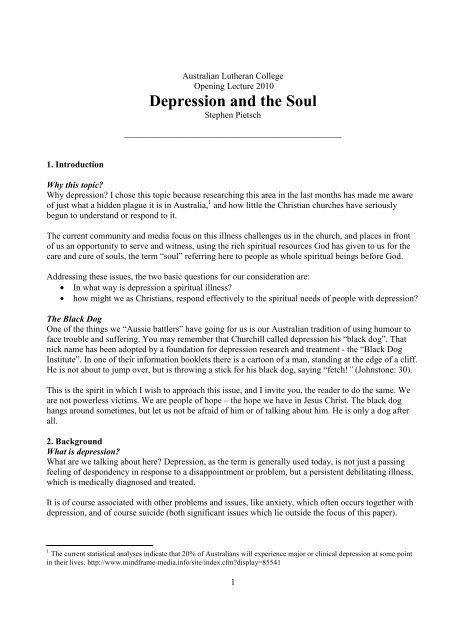
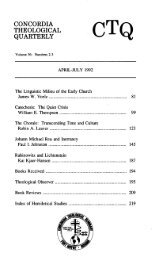
![VI nodaļa: CilvÄks â kas un kÄds viÅÅ¡ ir? [h]](https://img.yumpu.com/48350403/1/190x245/vi-nodaa-1-4-a-cilvaks-a-kas-un-kads-viaa-ir-h.jpg?quality=85)
